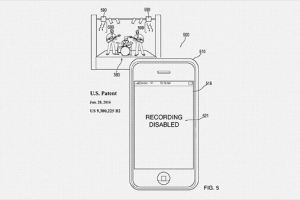When you are a company that is the size of Apple, you know for sure that there will be plenty of eyes pointed in your direction with every single step that you take. This includes the kind of patents that you acquire as well as apply for. It looks like Apple is currently developing a new kind of technology that is capable of disabling a smartphone's photo taking and video recording capabilities. How is this particular feat achieved? Through an infrared signal, according to the recently approved patent filing.
This is definitely technology that will divide opinions right down the middle. You can be sure that those who are fans of it will include proprietors of cinemas, theaters and concert organizers, as such technology would mean a greatly reduced chance of private recordings or piracy attempts. After all, there is no 100% fool-proof method of preventing piracy at the movies, but one can always take the effort to reduce the chances of a recorded copy from happening, and this is one of the ways to do so.
The patent itself describes how an infrared signal is used at venues where video recording is prohibited. The recording device in question (a smartphone in this instance) will then pick up the infrared signal, and change what is shown on the screen, or even have its video recording capabilities disabled. Pretty much like magic, don't you think so?
Of course, it is not as though the entire space will be blacked out from having videos recorded, since it has been suggested in the patent filing that the video capabilities will be disabled only if the smartphone in question is pointed in a certain direction. In other words, photos can still be snapped, but the camera would not function should it be pointed at the stage. Does this mean one can no longer take selfies with the stage or screen in the background? Sure sounds like it to me.
Apple has also suggested the infrared signal could be used to change what is shown on the screen, as well as to deliver additional information. For instance, if you point your smartphone at a particular exhibit in a museum, the smartphone will pick up the corresponding infrared signal, and show off details concerning said exhibit.
This is not too different from what I have seen at the Panasonic headquarters in Tokyo, Japan, where a showcase on their technologies that will see action in the upcoming 2020 Olympics. Knowing that Japan is going to play host to the entire world, you can simply point your smartphone at a sign, and see a corresponding translation to the language of your choice on your handset's screen. From what I have been told, infrared technology that sends data in a binary sequence makes this possible.
Other possible applications by this patent awarded to Apple would include retail therapy, where you need not have to scan a QR code to obtain additional information concerning a particular item that you are interested in, but rather, to simply "point-and-read", so to speak. Pretty nifty, don't you think so?

















